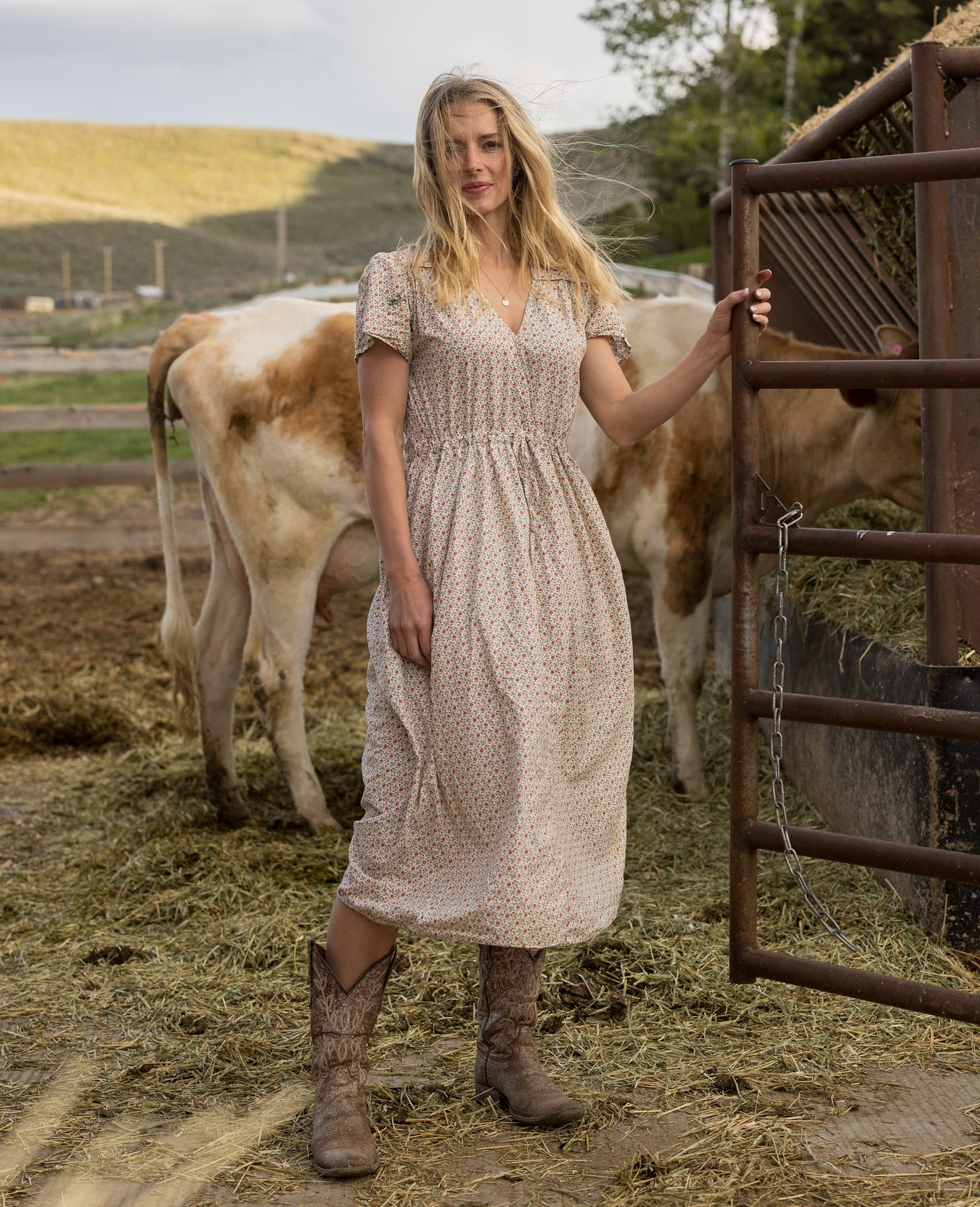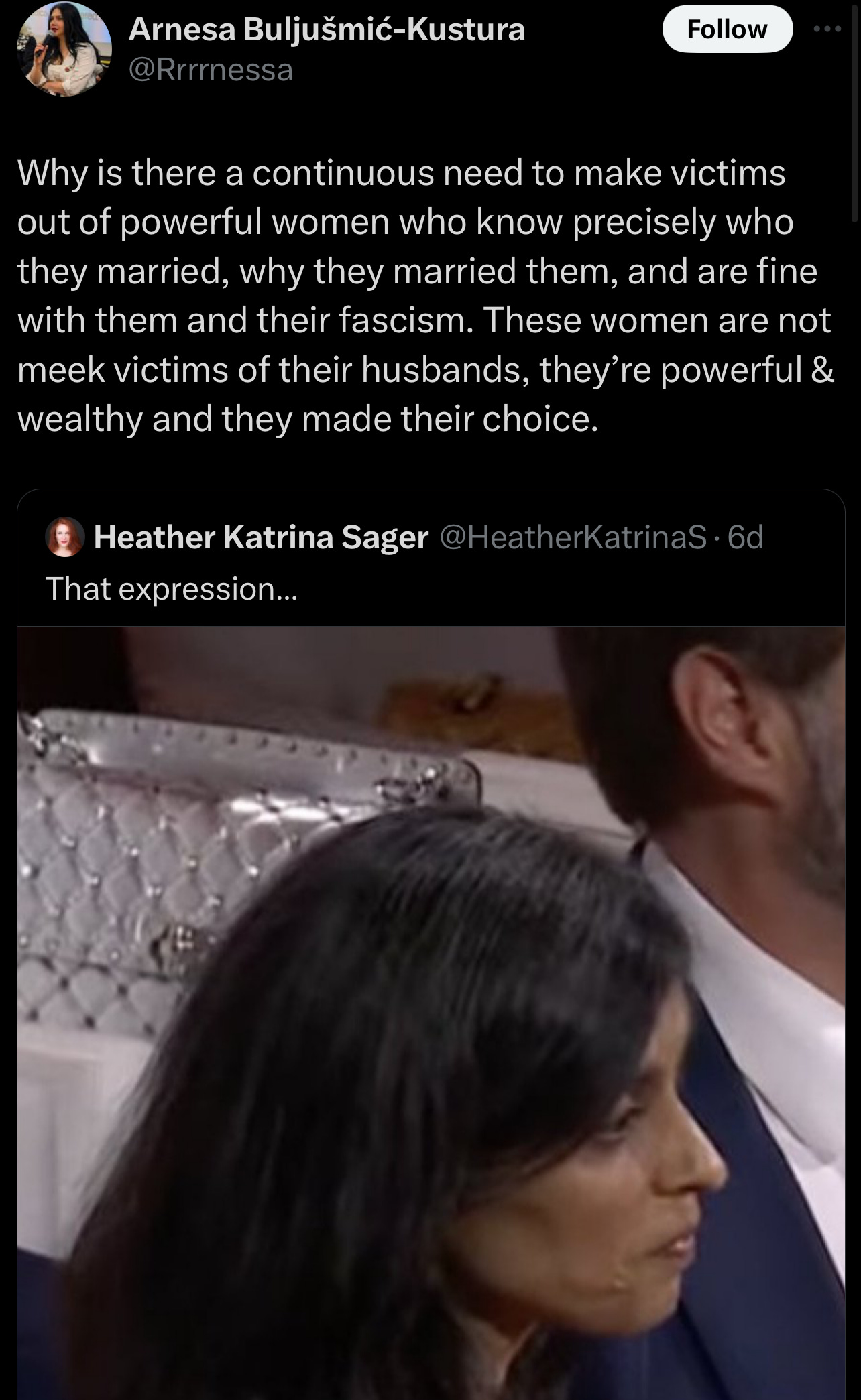The Imagined Victimhood of Conservative Women
The tearful response to Megan Agnew's "Ballerina Farm" profile is a textbook example of our impulse to infantilize and underestimate right-wing women.
When I first read Megan Agnew’s profile of “Queen of the Trad Wives” Hannah Neeleman, aka Juilliard-trained ballerina turned homesteader and controversial influencer Ballerina Farm, I had the same reaction as everyone else. I was startled by Agnew’s visceral depiction of Neeleman, twelve days postpartum, practically holding her own body together by the seams and hoisting herself onstage for a swimsuit competition. I was disturbed by what I imagined her most recent home birth might have looked like—in a cotton nightgown, doubled over the side of a wooden four-poster bed as she birthed her eighth child without pain management. I winced each time her husband spoke over her and at his story of how he “made a call” to JetBlue (the airline to which he is the familial heir) to have him seated next to Hannah on a flight after she’d brushed off his advances—playing God but making it look like a meet-cute. He would marry her, and she would become pregnant just months later while she was still an undergraduate at Juilliard.
It was enough to make my skin crawl, and I was far from alone in that feeling. I felt nauseous when Agnew pointed out that the only space on their 328-acre farm that belonged to Hannah and Hannah alone, a small barn she’d intended to turn into a ballet studio, perhaps as an oasis, had been converted into a space for the children’s Mormon homeschooling.

I thought about it harder. I remembered that 328 acres is quite a bit of land, to say the least. I was dumbfounded as to why the couple would agree to be profiled. As the de facto face of the trad wife movement, Hannah has received enough flack to know it would almost certainly provoke a negative reaction. And then it clicked—that was the point. Of course it was the point. One quick visit to the “Ballerina Farm” TikTok profile will show you just how great a magnet this article was, bringing in even more engagement to the account. Farming for engagement (no pun intended) has become so prolific and absurd that it’s often undetectable. It’s all smoke and mirrors, and people (including myself) will fall for it every time. All of Hannah’s most recent videos are peppered with comments from users who seem to have come directly from the article to her page to express concern, speaking both to her directly and with other users, converting the comment section to a forum on her happiness and well-being.
“Hannah, I sincerely hope you are okay.”
“The tiny little framed ballerina picture above the stove is absolutely gut-wrenching in light of the recent article.”
“The article is so sad. I hope you can find your way out one day. You deserve so much better.”
One TikTok user in her own video expressed how saddened she was by the piece, which she said was an example of “how exhausting it is to be a woman,” as if Hannah’s life held up a mirror to the average American woman’s experience.
The messages go on forever, and they go unacknowledged. That, too, I have to assume is intentional. Her silence leaves plenty of room for speculation. You can’t help but wonder what’s going through her head. Is she reading these? Is she hurt by them? Does she desperately want to speak up, but her mean, scary husband won’t let her? By the tone of the comments, it feels as though the audience thinks they’ve found a direct line of contact with the victim of a kidnapping. They’re gunning for some kind of reverse fairytale ending, where she awakens out of her trance and leaves it all behind. She burns the apron, throws on a tutu, and bursts through the curtains onstage at Lincoln Center.
Agnew's point of view towards Hannah is empathetic in the way that anyone should feel a base level of empathy for a woman who is often bed-bound for several days at a time from sheer exhaustion. However, I don’t think the takeaway should be, by any measure for Hannah to be treated as a victim. A number of readers seemed to miss that the piece is a scathing indictment of the Ballerina Farm brand of content creation: nothing about this woman’s day-to-day is desirable in the slightest, though Neeleman would like you to believe that it is. Agnew is quick to point out that on top of Hannah’s husband’s tremendous inherited wealth, Ballerina Farm is a highly lucrative enterprise. She describes the home’s antique wooden countertops, their collection of Le Creuset cookware, and an Aga gas stove. Ballerina Farm as an entity has thirty-three full-time employees, including a creative director.
“That is the biggest paradox: in selling the life of a stay-at-home mother, Neeleman and the other trad wives have created high-earning jobs. They are being paid to act out a fantasy,” Agnew writes.
What is missing from the pitiful but warmly supportive TikTok comments is any curiosity about the couple’s flirtations with religious natalism, which, while some have accused of being covertly present in Hannah’s content in the form of natalist propaganda, is perfectly conspicuous in the article. They describe their lifestyle choices as “what God wants.” They defend “the sanctity of life” with respect to abortion and premarital sex. It’s asinine to read those words as they come directly from Hannah’s mouth and assume that these are her husband Daniel’s beliefs alone and not Hannah’s—they are, in many ways, cut from the same cloth. They had the same religious upbringing and express similar values.
One key difference between them is that Daniel was born into wealth, whereas Hannah is a bonafide hustler who was able to enroll at Juilliard thanks to scholarship money she earned as prizes for beauty pageants, wise enough to know how valuable a resource beauty can be. While the story of a pretty Mormon girl breaking free from the church to chase her dreams only to be thwarted by a powerful, controlling man is a captivating one, that does not appear to be what’s happened here. There are ample reasons why a woman may choose to abandon her passions and live out her days declining epidurals, scoring sourdough, and shaking her head disapprovingly at women who get pregnant out of wedlock. In this case, I’m willing to bet it’s got something to do with the whole JetBlue inheritance thing and, of course, a steadfast devotion to the Mormon church. Joseph Smith had a lot more to say about mothers and wives than he did ballerinas. We can feel sad because we’re watching a stranger make a choice we would never make for ourselves and are inclined to project our wants and beliefs onto her. It should not, however, warrant sympathy, pity, or compel us to “save” her.
There is a fantasy that exists among primarily left-leaning women that we are somehow bound to one another in some kind of Ya-Ya Sisterhood. We’d like to believe we have an allegiance to one another that is more powerful than any other identifier—race, class, religion, or creed. Presumably, this stems from the notion of a common enemy—controlling, often violent men. It’s a nice idea, but it’s also incredibly naive. It may be a tough pill to swallow, but a considerable number of women would much rather align themselves with wealthy, powerful men than they would other women. It does not require coercion or manipulation; it is a decision. Culturally, we don’t like to think of women as being cutthroat, or selfish, or willing to suppress their desires in exchange for financial security and power. Plenty of women would Tonya Harding the kneecaps of the entire women’s rights movement over and over again if it meant sparing themselves the subjugation less fortunate women have to deal with, and a $30,000 oven in the kitchen to sweeten the deal. By casting women like Hannah as helpless victims, rather than sovereign agents in designing their own lives, we are assuming women to be weak, clueless creatures who have been cruelly taken advantage of. Paradoxically, we are practicing the same “trad” ideals we claim to disdain.
We’ve been down this road before. We saw it in 2016 when a gif of Melania Trump, newly anointed as the First Lady of the United States, went viral, when a smile at her husband quickly faded to a look of disgust, or even pain. It became a meme, spawning the hashtag #FREEMELANIA partially in jest but also very seriously in concern. Stassa Edwards analyzed this phenomenon for Jezebel, writing,
“That Melania agreed with her husband was decidedly beside the point: here was a pretty white woman who didn’t smile and who clearly didn’t relish her role as First Lady. She must be a victim of Donald Trump; she must be just like the women who lined the Mall holding signs and protesting Trump’s election to the presidency. Melania Trump must be different. This was, of course, all fiction.”
At some point over the weekend, around the same time Agnew’s article was published, a friend of mine shared a screenshot of this tweet on Instagram about Vice Presidential candidate J.D. Vance and his wife, Usha Vance:
Many have noted that Usha and JD’s marriage is an interesting one, Usha being a first-generation Indian American woman and JD being a staunch proponent of closing the border to migrants who are, in his eyes, destroying the country. The two met at Yale Law School and have three children together. She was a registered Democrat as recently as 2014, just two years before the release of Hillbilly Elegy. So the only conclusion we can draw is that she’s been brainwashed, misled, manipulated, or worse. Surely no woman would follow her husband down the far-right rabbit hole if it meant she maybe, just maybe, would get to be the wife of a senator, or better yet, the Vice President of the United States. That is not to draw a one-to-one comparison between the trad wives and Usha Vance, they obviously are operating on greatly different levels. What they do share, however, is the quality of their public reception them—because they are women, their hearts cannot possibly lie in a life disjointed with feminism. Not without a man pulling the strings.
This dynamic is replicated constantly, where normal, everyday women feel empathy for powerful women who not only would never dream of extending the same to them but are also active participants in the subjugation and degradation of their livelihoods. They know this about themselves. How they rationalize it, I’m not sure, but there is nothing confusing about the words “Nationwide Abortion Ban” to a Yale-educated mother of three standing by her man at the Republican National Convention. She knows where the exit door is.





I've been reading Toni Morrison's "The Source of Self-Regard" lately and so far, I've read two essays which definitely echo your points/sentiments: "Women, Race, and Memory" and "Cinderella's Stepsisters." In both essays, Morrison is unpacking (and admonishing) the way women will willingly dominate and subjugate other women in an attempt to "be male-like" and/or climb their way up in the patriarchy; they're both great reads.
The idea that anyone could be considered “traditional” (conservative) when her living is made via the internet and adult beauty pageants in Vegas is cognitive dissonance at it’s finest.